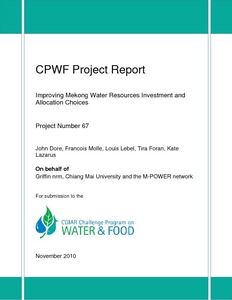Violent conflict affects three quarters of Asia’s forests and tens of millions of people. In Cambodia, for example, nearly half of the 236 land conflicts recorded in 2009 escalated to violence. Because forest conflict is such a major issue in the region, we need a better understanding of the underlying causes, impacts, and management solutions. This issues paper sheds light on these topics, drawing lessons from eight new case studies.
Search results
Showing items 1 through 9 of 21.-
Library ResourceReports & ResearchSeptember, 2010China, Indonesia, Cambodia, Laos, Thailand, Vietnam, South-Eastern Asia
-
Library ResourceReports & ResearchJuly, 2010Thailand
The objective of this report is mainly to identify priority issues associated with community forestry in different contexts in Thailand, and based from this, analyze capacities of key community forestry stakeholders and come up with recommendations for RECOFTC's Thailand Country Program.
-
Library ResourceReports & ResearchDecember, 2010Vietnam, Cambodia, Laos, Thailand, South-Eastern Asia
This paper applies the principles of water-use accounts, developed in the first of the series, to the Mekong River basin in Southeast Asia. The Mekong Basin covers six
countries, the River rises in China, but there are substantial downstream tributaries
from Thailand, Laos, Cambodia, and Vietnam, and from a small area in Myanmar. A
unique feature is the reverse flow from the Mekong to the Tonle Sap via the Tonle Sap
River at the height of the wet season flow and its ebb as the river levels fall.
-
Library ResourceReports & ResearchNovember, 2010Thailand, South-Eastern Asia
We conducted a rapid assessment of the sustainability performance of the Thai power development plan and a number of related planning processes, focusing on the Thai plan’s implications for development of hydropower in the Mekong region. We used the August 2009 draft Hydropower Sustainability Assessment Protocol (HSAP), which is a qualitative multi-criteria audit tool designed to be used by a wide range of interested parties.
-
Library ResourceReports & ResearchDecember, 2010Bangladesh, Bhutan, Brazil, Burkina Faso, Cambodia, Chad, Chile, China, Colombia, Eritrea, Ethiopia, Ghana, Honduras, India, Iran, Kenya, Laos, Malawi, Mexico, Nepal, Niger, Nigeria, Pakistan, Peru, South Africa, Sudan, Thailand, Vietnam, Zimbabwe, Southern Africa, South America, Western Africa, Middle Africa, Eastern Africa, Central America, Western Asia, Northern Africa, Southern Asia, South-Eastern Asia
IN response to an on-line survey, 76 project leaders and staff gave CPWF Phase 1 a
generally favorable review. Respondents came from 68 CPWF projects in 45 countries on
three continents. The survey sought to help learn what went well in Phase 1, what did not
go so well and can be improved in Phase 2.
Nearly three-quarters of respondents felt that they had achieved different research results,
outcomes and impacts as a result of participation in the CPWF than otherwise possible from
-
Library ResourceReports & ResearchNovember, 2010Cambodia, Laos, Thailand, South-Eastern Asia
The CPWF Project PN67 “Improving Mekong Water Allocation” was a key, collaborative
activity of the Mekong Program on Water, Environment and Resilience (M-POWER). The
goal of contributing to water allocation policy and practice which results in a more
optimal and equitable use of water by society has been pursued by research across the
Mekong Region and active engagement with policymakers. The project team have
examined the use of a wide range of decision-support tools, in many decision-making
-
Library ResourceReports & ResearchDecember, 2010Eritrea, Peru, Bangladesh, Benin, Bhutan, Bolivia, Botswana, Brazil, Burkina Faso, China, Colombia, Ecuador, Egypt, Ethiopia, Ghana, Honduras, India, Iran, Kenya, Laos, Mali, Mozambique, Nepal, Nicaragua, Niger, Nigeria, South Africa, Sudan, Thailand, Togo, Uganda, Vietnam, Zimbabwe, Western Africa, Southern Asia, South-Eastern Asia, Middle Africa, Central Asia, Eastern Africa, Central America, South America, Western Asia, Northern Africa, Southern Africa
The CPWF was designed to be different. Developed in response to a call for change in a previous round of Consultative Group on International Agricultural Research (CGIAR) system
reform, the CPWF was intended to foster cross-CGIAR cooperation and find ways to bring in new partners. Over time the CPWF has successfully broadened the CGIAR’s sources of
innovative research on water and food. Through its broad partnerships, the program conducts research that leads to positive impact on the poor and to policy change. The CPWF does this by
-
Library ResourceReports & ResearchDecember, 2010Cambodia, Laos, Myanmar, Thailand, Vietnam, China, South-Eastern Asia
The impacts of climate change on agriculture and food production in Southeast Asia will be largely mediated through water, but climate is only one driver of change. Water resources in the region will be shaped by a complex mixture of social, economic and environmental factors.
-
Library ResourceReports & ResearchDecember, 2010Laos, Thailand, Cambodia, Vietnam, South-Eastern Asia
The report aims to provide critical input to the Mekong River Commission's (MRC) regional Climate Change and Adaptation Initiative (CCAI) which was launched shortly after the formulation of this project. The CCAI is a collaborative regional initiative designed to address the shared climate change adaptation challenges of LMB countries in response to the potential effects of climate change on the socio-economic characteristics and natural resources of the LMB region. MRC has identified need for a more informed understanding of the potential impacts from climate change.
-
Library Resource
A Multi-Level Approach
Reports & ResearchPolicy Papers & BriefsSeptember, 2010Malaysia, Thailand, China, Indonesia, Vietnam, Cambodia, Russia, India, Kazakhstan, Eastern Asia, Oceania, Southern Asia, South-Eastern AsiaThis report presents the results of extensive work of the smart green infrastructure task force commissioned by the World Bank under the Global Tiger Initiative (GTI). The report benefited from advice, ideas, and information about tigers and tiger-friendly infrastructure development from staff at the World Bank, and from several institutions that promote tiger and biodiversity conservation throughout the world.
Land Library Search
Through our robust search engine, you can search for any item of the over 64,800 highly curated resources in the Land Library.
If you would like to find an overview of what is possible, feel free to peruse the Search Guide.









